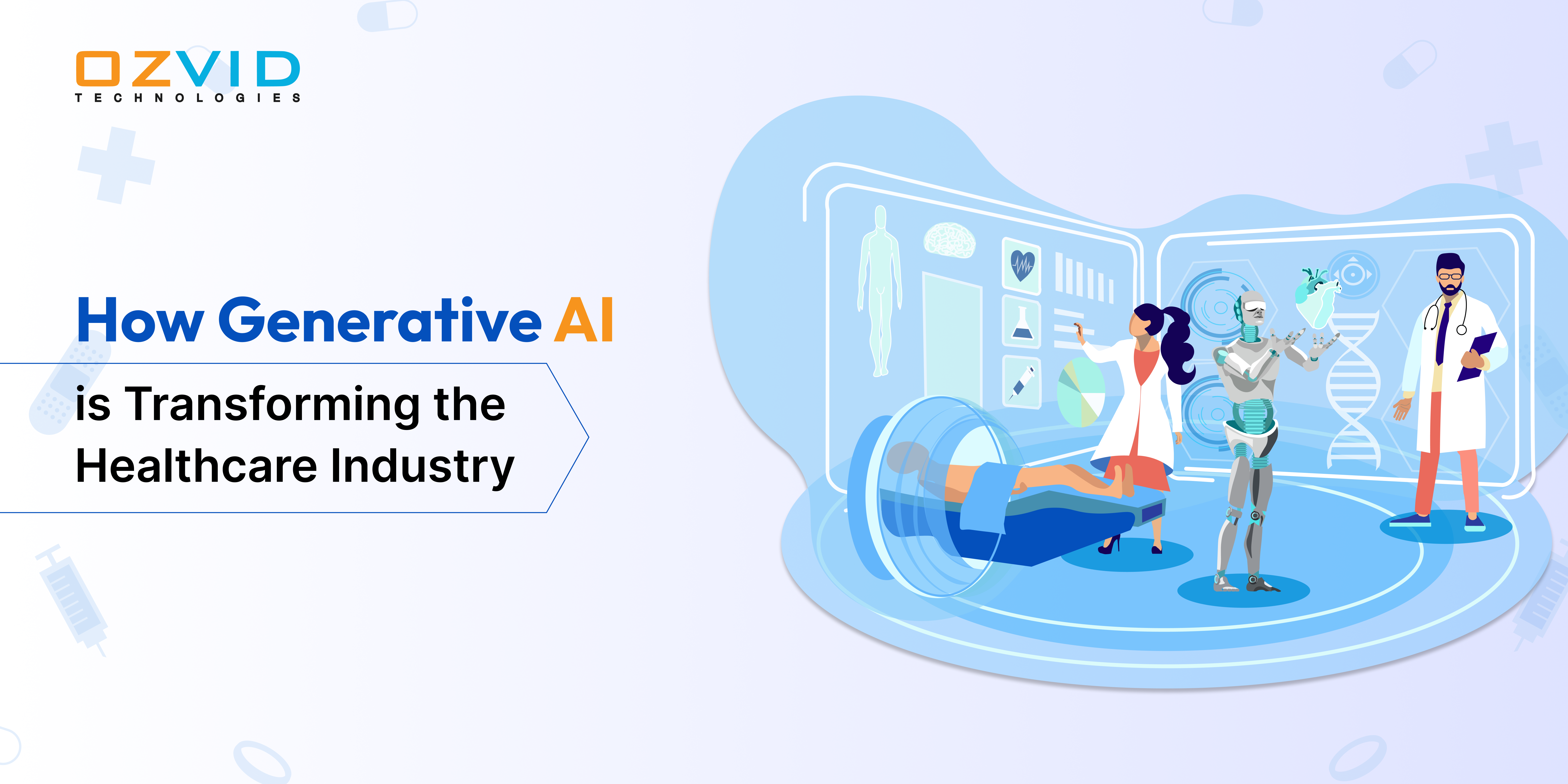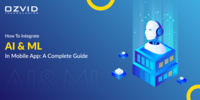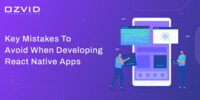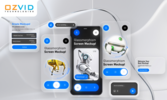- Apr 21, 2025
Share this post on:

According to statistics, USA is estimated to generate $102.2 billion in revenue by 2030. The healthcare industry is undergoing a profound transformation, driven by the rapid adoption of generative artificial intelligence (Gen AI). As we step into 2025, this cutting-edge technology is revolutionizing patient care, diagnostics, drug development, and operational efficiency.
Generative AI refers to advanced algorithms capable of creating new content or predictions based on existing data patterns. In healthcare, it is enabling groundbreaking solutions across various domains, from personalized medicine to robotic surgeries.
Key Takeaways
- Generative AI is transforming healthcare through innovations in drug discovery, diagnostics, personalized medicine, and operational efficiency.
- Emerging trends like multimodal models and synthetic data generation promise further advancements in 2025.
- Despite challenges like ethical concerns and data security risks, the benefits of generative AI outweigh its limitations.
Key Applications of Generative AI in Healthcare
Generative AI is revolutionizing healthcare by introducing innovative solutions across diagnostics, treatment, research, and patient engagement. Below are expanded insights into the key applications of Gen AI in the healthcare industry:
1. Drug Discovery and Development:
Generative AI is transforming drug discovery, a traditionally time-consuming and costly process. By leveraging advanced algorithms like Generative Adversarial Networks (GANs) and Variational Autoencoders (VAEs), AI can:
- Simulate Molecular Structures: Predict protein folding and molecular interactions to identify potential drug candidates.
- Design Novel Compounds: Analyze chemical databases to suggest innovative drug compositions.
- Optimize Clinical Trials: Predict adverse effects and success probabilities, reducing trial failures.
For example, generative AI has enabled pharmaceutical companies to cut drug discovery timelines by over 50%, saving billions of dollars annually.
2. Personalized Medicine:
Generative AI is advancing precision medicine by tailoring treatments based on individual patient profiles. It uses genetic data, medical history, and real-time health metrics to:
- Create Custom Therapies: Develop personalized medication regimens for chronic conditions like diabetes or cancer.
- Adjust Treatment Plans Dynamically: Monitor patient responses and refine therapies for optimal outcomes.
This approach ensures higher treatment efficacy while minimizing side effects, making healthcare more patient-centric.
3. Enhanced Medical Imaging:
Medical imaging is critical for accurate diagnostics, and generative artificial intelligence is enhancing this domain through:
- Synthetic Image Creation: Tools like DALL-E 2 and GLIDE generate realistic images for training medical professionals.
- Improved Image Analysis: AI models analyze X-rays, MRIs, and CT scans to detect anomalies with high precision.
- Disease Modeling: Generative AI synthesizes images of disease progression to help clinicians understand complex conditions.
These advancements are reducing diagnostic errors and improving early detection rates for diseases like cancer.
4. Virtual Health Assistants:
Generative AI-powered virtual assistants are reshaping patient engagement by:
- Providing 24/7 Support: Answering medical queries, scheduling appointments, and offering symptom analysis.
- Chronic Disease Management: Monitoring conditions like diabetes or hypertension through regular interactions.
- Medication Reminders: Ensuring patients adhere to prescribed treatments.
Babylon Health’s chatbot exemplifies how virtual assistants improve accessibility while freeing up healthcare providers for critical tasks.
5. Clinical Documentation Automation:
Documentation is a significant burden for healthcare professionals. Generative AI automates these tasks by:
- Summarizing patient diagnoses and treatment plans using tools like GPT-based models.
- Integrating with Electronic Health Records (EHR) systems to streamline data entry.
This automation allows clinicians to focus more on patient care rather than administrative work.
6. Predictive Maintenance of Medical Equipment
Generative AI predicts potential failures in medical devices by analyzing usage patterns and performance data. This enables:
- Proactive Repairs: Hospitals can schedule maintenance before breakdowns occur.
- Reduced Downtime: Ensuring uninterrupted availability of critical equipment.
Such predictive capabilities enhance operational efficiency and improve patient outcomes.
7. Cognitive Behavioral Therapy (CBT):
Generative AI creates virtual environments for mental health therapy. These environments allow patients to confront fears or anxieties safely through controlled simulations. This application is particularly effective for treating social anxiety disorders.
8. Population Health Management:
Generative AI analyzes large-scale health data to provide insights into population health trends. It helps healthcare providers:
- Predict Disease Outbreaks: Identify patterns that indicate emerging health crises.
- Optimize Resource Allocation: Ensure medical supplies reach areas with the greatest need.
This application improves public health strategies and enhances preventive care measures.
9. Virtual Surgical Simulations:
AI-powered simulations allow surgeons to practice procedures in a risk-free environment. These simulations include:
- Detailed 3D Anatomy Models: Helping medical students understand complex structures.
- Realistic Surgical Scenarios: Allowing repeated practice for skill refinement.
Such training tools improve surgical precision and reduce errors during real-life operations.
10. Preventing Medical Errors:
Medical errors are a leading cause of preventable deaths globally. Generative AI mitigates these risks by:
- Correcting Documentation Mistakes: Automatically fixing errors in e-prescriptions or patient records.
- Ensuring Data Accuracy: Validating information entered into healthcare systems.
These capabilities enhance patient safety significantly.
11. Synthetic Data Generation:
Generative AI creates synthetic yet realistic datasets for research purposes while maintaining patient privacy. This accelerates innovation in areas like drug development without ethical concerns regarding data misuse.
12. Telemedicine Support:
Generative AI in healthcare industry facilitates telemedicine by analyzing real-time data from wearable devices and providing actionable insights during virtual consultations. This application expands access to healthcare services in remote areas.
Benefits of Generative AI in Healthcare
Generative AI is revolutionizing the healthcare industry by improving efficiency, accuracy, personalization, and accessibility. Its applications span diagnostics, drug discovery, personalized medicine, and operational processes. Below are the key benefits of generative AI in healthcare:
1. Enhanced Diagnostics:
Generative AI improves diagnostic precision by analyzing vast amounts of medical data, including imaging studies like MRIs, CT scans, and X-rays. It can:
- Detect subtle abnormalities that might be missed by human eyes.
- Predict disease progression for earlier intervention.
- Enhance imaging techniques to improve image quality and resolution.
For example, AI-powered tools are achieving remarkable accuracy in detecting early-stage cancers, enabling timely treatment and better outcomes.
2. Accelerated Drug Discovery:
Generative AI significantly shortens the drug discovery process by:
- Designing new molecular structures based on desired properties.
- Simulating drug interactions with biological targets.
- Identifying promising candidates for testing.
This approach reduces the time and cost of bringing new drugs to market while increasing the likelihood of success in clinical trials.
3. Personalized Medicine:
Generative AI enables hyper-personalized treatment plans by analyzing patient-specific data such as genetic profiles, medical history, and lifestyle factors. It can:
- Predict risks for chronic conditions like diabetes or heart disease.
- Recommend customized therapies tailored to individual needs.
- Minimize adverse effects by shifting from one-size-fits-all treatments to precision medicine.
This personalized approach improves patient outcomes and satisfaction while reducing healthcare costs.
4. Cost Savings:
Generative AI helps reduce healthcare expenses through:
- Streamlined administrative processes like documentation and billing automation.
- Improved resource allocation based on predictive analytics.
- Preventive maintenance of medical equipment to avoid costly breakdowns.
By optimizing operations and minimizing inefficiencies, healthcare providers can deliver high-quality care at a lower cost.
5. Improved Patient Engagement:
AI-powered virtual assistants enhance patient engagement by:
- Providing 24/7 support for queries and appointment scheduling.
- Offering medication reminders and health tips tailored to individual needs.
- Educating patients about their conditions with personalized materials.
This proactive approach empowers patients to manage their health effectively while reducing the burden on clinicians.
6. Synthetic Data Generation:
Generative AI creates realistic yet anonymized datasets for research purposes without compromising patient privacy. These synthetic datasets help train machine learning models and accelerate innovation in drug development.
Conclusion
At OZVID Technologies, we recognize the transformative potential of generative AI in healthcare. From drug discovery to personalized medicine, enhanced diagnostics, and operational efficiency, Gen AI is reshaping the industry at an unprecedented pace. Our expertise lies in integrating these technologies seamlessly into healthcare systems while addressing challenges such as ethical compliance and data security.
Partner with OZVID Technologies today to unlock the full potential of generative AI in your healthcare operations—ushering in a smarter, more efficient, and patient-centric future!
FAQs
What is generative AI in healthcare?
Generative AI in healthcare refers to the use of advanced artificial intelligence models capable of creating new data, predictions, or insights by analyzing existing medical datasets. These systems are designed to address challenges in medical practice and research by generating synthetic patient data, simulating disease progression, and predicting outcomes.
How does generative AI improve diagnostics?
Generative AI improves diagnostics by analyzing complex medical images like X-rays, MRIs, CT scans, and PET scans with remarkable precision. It uses deep learning techniques to detect patterns associated with diseases and identify anomalies that might be missed by human experts. Beyond detection, generative AI can enhance image quality, enabling clearer visualization of abnormalities.
Can generative AI help reduce healthcare costs?
Yes, generative AI has the potential to significantly reduce healthcare costs by streamlining various processes. Additionally, generative AI automates administrative tasks like clinical documentation and electronic health record (EHR) management, freeing up healthcare providers to focus on patient care.
What are the ethical challenges of using generative AI in healthcare?
The adoption of generative AI in healthcare comes with several ethical challenges. One major concern is ensuring unbiased outcomes; AI models trained on incomplete or skewed datasets may produce inaccurate or discriminatory results. Another critical issue is protecting sensitive patient data from breaches or misuse, as generative AI relies heavily on large volumes of personal health information.
How is generative AI enabling personalized medicine?
Generative AI enables personalized medicine by analyzing vast amounts of data from genetic profiles, electronic health records, and wearable devices to tailor treatments for individual patients. It predicts disease trajectories and responses to specific therapies based on unique health metrics, ensuring that care plans are customized to each person’s needs.










